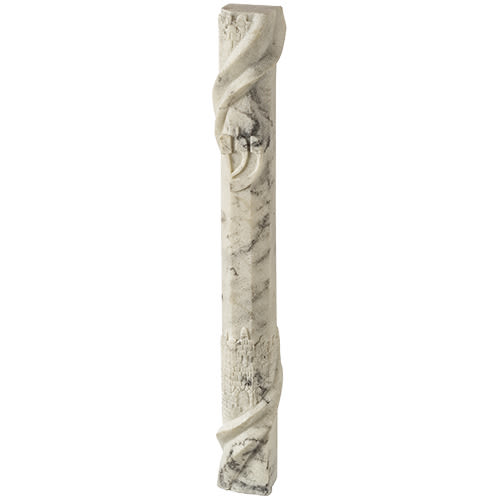
Looking for Loopholes?
We do not need to look for loopholes to circumvent the laws of Shabbat to earn money, even to use that money for a mitzvah. Hashem despises any mitzvah that is performed at the cost of desecrating Shabbat.

“Keep the Sabbath, for it is a sacred thing for you.” (Shemot 31:14)
There is an incredible story about R’ Moshe Leib from Sossov, zt”l, that has a practical and relevant moral about keeping Shabbat:
The Rebbe once arrived at a village on Erev Shabbat. He saw a Jewish bartender selling wine to the non-Jews at a tavern. He seemed to be completely unaware that Shabbat was rapidly approaching; he didn’t seem to have any intention of closing. The Rebbe approached him and said, “It will be Shabbat soon and it is forbidden to do any business transactions on Shabbat.”
“I cannot stop working on Shabbat,” explained the merchant. “My wife and children depend on me. If I don’t serve my customers on Shabbat somebody else will. My entire livelihood will be lost!”
“I understand,” the Rebbe replied, “but you must nevertheless not sell beverages on Shabbat. The Sages have taught us that when a Jew observes Shabbat properly and according to the Jewish law, they will not suffer any losses as a result.”
The Jew acquiesced to the Rebbe’s request. And he let his customers know that beginning the following week, the tavern would be closed on Shabbat and Yom Tov.
When the customers heard this, they were upset. They went to the tavern’s owner and told him that the Jewish bartender refused to work on Shabbat. Outraged, the owner went to the Jewish bartender and said, “How dare you make new rules for my tavern!”
“Until recently I did not know that the Torah forbids doing business on Shabbat,” explained the Jew, “but a wise Jew recently came to our village. He was fluent in all the Jewish laws. He explained that I have not been behaving in accordance with the Jewish law until now and that I am not allowed to work on Shabbat.”
“It seems to me,” answered the owner, “that even this wise Jew would not be willing to suffer a financial loss for the sake of observing Shabbat. How can he ask you to? I want to test his sincerity by presenting him with a similar dilemma. If he remains steadfast in his convictions, I will agree to keep the tavern closed on Shabbat.”
To test the Rebbe, the owner decided to scatter a large sum of money in the bushes along the path that the Rebbe would take on his way to shul the following Shabbat.
And he waited to see what the Rebbe would do.
He saw the Rebbe approaching. When he reached the scattered money, the Rebbe kept walking as if he hadn’t seen them at all. However, the Rebbe suddenly stopped and turned back. He leaned over and carefully examined the money. He lifted his head and raised his hands towards the heavens as if in prayer. After a few moments, the Rebbe continued along his way.
The tavern owner emerged from his hiding place and chased after the Rebbe. When he caught up with him, he said, “Holy man! You passed my test by withstanding temptation. Please forgive me for doubting the sincerity of your words. I realize that you are willing to sacrifice a large sum of money for the sake of Shabbat and its holiness. From now on I will keep my tavern closed on Shabbat. However, I have a question. At first, you passed the money without seeming to give it notice. Then, you turned around and carefully examined the money and seemed to pray. Why?”
“At first,” answered the Rebbe, “I passed by the money and didn’t even think to stop knowing that it was Shabbat. As I walked, my Yetzer Harah whispered to me, ‘You are constantly involved in trying to redeem Jews from prison. Think of how much good this money can help you fund this critical mitzvah!’ I began to reason with myself that perhaps there was a way that I could place the money in my possession until after Shabbat. After all, saving a life supersedes the laws of Shabbat. So, I went back to see if there was enough money to save one’s life by securing their freedom from prison. Sure enough, the sum was exactly what is usually required to fulfill this mitzvah! Then, my Yetzer Harah said, ‘See! The Heavens have provided exactly the amount you need for this mitzvah. ‘ I didn’t know what to do.
“So, I prayed that Hashem provide me with a clear head to know what to do. Immediately I realized that I currently did not need to fulfill now the mitzvah, and if Hashem was presenting me with a sum of money for future use, He certainly can provide me with the funds when they are necessary in a way that is without reproach or without being questionable.”
This story teaches us a powerful lesson: We do not need to look for loopholes to circumvent the laws of Shabbat to earn money, even if you want to use that money for a mitzvah.
Non-Jews have a philosophy that the “ends justify the means.” However, this is not a Jewish belief. This is not one of our values. Just as it is forbidden to use matzah that was acquired through theft, Hashem despises the mitzvah of eating matzah that is fulfilled with stolen matzah, so too, Hashem despises any mitzvah that is performed at the cost of desecrating Shabbat. Since Hashem is the ultimate provider of one’s livelihood and their wealth, he can provide you with completely Kosher funds, and you cannot gain anything from violating His Will.
This is possibly alluded to by the pasuk above. Keep the Sabbath – completely without looking for leniencies in the pursuit of money, because Hashem who is sacred is the one who is providing for you all your needs.
**
The Kalever Rebbe is the seventh Rebbe of the Kaalov Chasidic dynasty, begun by his ancestor who was born to his previously childless parents after receiving a blessing from the Baal Shem Tov zy”a, and later learned under the Maggid of Mezeritch zt”l. The Rebbe has been involved in outreach for more than 30 years and writes weekly emails on understanding current issues through the Torah. Sign up at www.kaalov.org.












Tell us what you think!
Thank you for your comment!
It will be published after approval by the Editor.